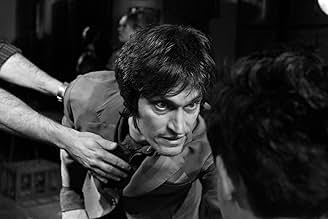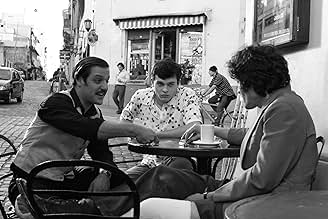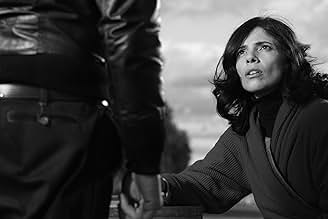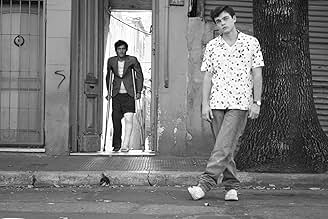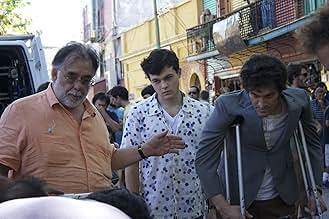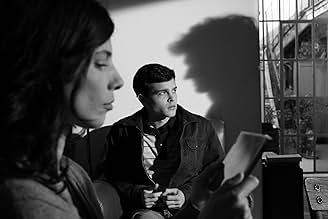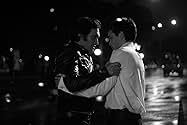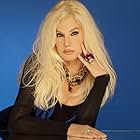Bennie travels to Buenos Aires to find his long-missing older brother, a once-promising writer who is now a remnant of his former self. Bennie's discovery of his brother's near-finished play... Read allBennie travels to Buenos Aires to find his long-missing older brother, a once-promising writer who is now a remnant of his former self. Bennie's discovery of his brother's near-finished play might hold the answer to understanding their shared past and renewing their bond.Bennie travels to Buenos Aires to find his long-missing older brother, a once-promising writer who is now a remnant of his former self. Bennie's discovery of his brother's near-finished play might hold the answer to understanding their shared past and renewing their bond.
- Director
- Writers
- Stars
- Awards
- 1 win & 5 nominations total
Rodrigo de la Serna
- José
- (as Rodrigo De La Serna)
Erica Rivas
- Ana
- (as Érica Rivas)
Sofía Gala Castiglione
- María Luisa
- (as Sofía Castiglione)
- Director
- Writers
- All cast & crew
- Production, box office & more at IMDbPro
Featured reviews
17 year-old Bennie works as a waiter on a cruiseship. When the ship suffers engine difficulties and docks in Buenos Aires, he uses the opportunity to attempt to reconnect with his estranged brother Tetro, a once promising writer. He is welcomed with open arms by Tetro's girlfriend, Miranda. She longs to know the truth behind her boyfriends past and what made him the misanthrope he is today. Tetro is hostile towards his brother, his plan was to never see any of his family again, and so keeps him at arms length. Bennie discovers an incomplete play, written in code whilst his brother was undergoing psychiatric treatment. He decides to finish the play and enter it in a festival run by Argentina's most powerful critic, Alone. Faced with this upheaval, Tetro is forced to come to terms with his relationship to his younger brother and his father, a famous conductor.
Tetro is, at its core, a film about family, in particular the relationship between brothers and their Father. A theme Francis Ford Coppola has immersed himself in before, most notably in The Godfather and Rumble Fish. Through a series of flashbacks we are given a glimpse of major events in Tetro's youth, his relationship with his father (played by Klaus Brandauer) and his subsequent departure. There are huge family secrets known only to Tetro and revealed to Bennie in an ending which echoes great literary and operatic works. Coppolas love of opera and theater is stamped all over the script and the city of Buenos Aires seems to be the perfect background in which to set this story.
Shot stunningly in digital monochrome with colour flashbacks, it has some aesthetic similarities to Rumble Fish. Coppola and cinematographer Mihai Malaimare Jr. reportedly site On The Waterfront and La Notte as big influences on the films visual style. There are certainly elements of both here, with the film also retaining its visual sense of self. It is operatic in both its narrative and its mise-en-scene. The idea of cutting between colour and monochrome as well as changing aspect ratios sounds as if it would be jarring, and it typically is. But for the purposes of Tetro it works perfectly.
Seen as a controversial choice by some, Vincent Gallo brings an edge to the titular character that some other actors may have lacked. However it is newcomer Alden Ehrenreich who steals the show as Bennie, a wayward teenager looking for guidance and approval. Maribel Verdu, as Miranda, provides the conduit between the two in a typicaly solid performance.
Hollywood is littered with once great directors who have fallen from grace, which makes Tetro all the more remarkable as a return to form from one of the greatest, Francis Ford Coppola.
Tetro is, at its core, a film about family, in particular the relationship between brothers and their Father. A theme Francis Ford Coppola has immersed himself in before, most notably in The Godfather and Rumble Fish. Through a series of flashbacks we are given a glimpse of major events in Tetro's youth, his relationship with his father (played by Klaus Brandauer) and his subsequent departure. There are huge family secrets known only to Tetro and revealed to Bennie in an ending which echoes great literary and operatic works. Coppolas love of opera and theater is stamped all over the script and the city of Buenos Aires seems to be the perfect background in which to set this story.
Shot stunningly in digital monochrome with colour flashbacks, it has some aesthetic similarities to Rumble Fish. Coppola and cinematographer Mihai Malaimare Jr. reportedly site On The Waterfront and La Notte as big influences on the films visual style. There are certainly elements of both here, with the film also retaining its visual sense of self. It is operatic in both its narrative and its mise-en-scene. The idea of cutting between colour and monochrome as well as changing aspect ratios sounds as if it would be jarring, and it typically is. But for the purposes of Tetro it works perfectly.
Seen as a controversial choice by some, Vincent Gallo brings an edge to the titular character that some other actors may have lacked. However it is newcomer Alden Ehrenreich who steals the show as Bennie, a wayward teenager looking for guidance and approval. Maribel Verdu, as Miranda, provides the conduit between the two in a typicaly solid performance.
Hollywood is littered with once great directors who have fallen from grace, which makes Tetro all the more remarkable as a return to form from one of the greatest, Francis Ford Coppola.
For Francis Ford Coppola, the last forty years have been an uphill battle, not only with critics but also against an adoring public who have held him to the highest of standards since such masterpieces as "The Godfather" and "The Godfather: Part 2", both having brought home Best Picture Oscars and garnering best Director nods, the latter presenting him with the win. Films like "One from the Heart" and "Peggy Sue Got Married" make even his most hardcore of fans wonder, "What the hell is going through this guys freakin' skull?" Can directors truly lose their finesse? Can these just be metaphorical ruts like we've seen from the recent string of M. Night Shyamalan disasterpieces? What's the exact percentage ratio of wine from Coppola Vineyards that he consumes to that of which he produces? I digress. Now two years after the mediocre "Youth Without Youth", Coppola churns out "Tetro", a small little self authored Indy film that may just be the one he needs to regain credibility in the eyes of his audiences. The question is
does he pull it off? Bennie (Played by fresh face Alden Ehrenreich) has traveled to Buenos Aires to re-connect with his estranged brother (Vincent Gallo, Buffalo 66') who now goes by the name of "Tetro". Upon his arrival, he is greeted by the gorgeous Miranda (Mirabel Verdu), Tetro's girlfriend, who graciously invites him to stay at their home against Tetro's own reservations. It doesn't take long before Bennie begins to realize that his long lost brother is not the person he once was, but rather an on edge, manic and short tempered poet. "When I met him," says Miranda, "he said he was a writer. He held everything he ever wrote against his chest." As the story unfolds absolutely nothing is what it appears to be and when Bennie gets his hands on one of Tetro's unfinished plays, he finds out that the true story of his family holds secrets darker than he could have ever imagined.
Simply put, "Tetro" is Francis Ford Coppola's reinvention back into "quality" cinema and a perfect example of the wonder that can be achieved when a Director is in control of practically all creative aspects of his work. Don't be mistaken, if you're looking for the Coppola from the 70's, he's long gone. This new Coppola has been reborn, emerging as someone quite different. Funded entirely through revenue from his private vineyard, he's created one of the most stylistically atmospheric black and white films that I've seen in recent memory. One can't help but feel that there are heavy influences by the great Italian filmmaker Federico Fellini throughout, especially through the incorporation of operatic high drama and scenes that feel all too autobiographic to be dismissed as pure coincidence. In addition, there is a subtle Noir accent which is credited to Mihai Malaimare's gorgeous cinematography. Coppola is now, a true Indy, non-conformist filmmaker and my gut tells me that he really doesn't care. Instead, he doesn't give it all away, but rather does an exceptional job of keeping the motives, feelings and details about his characters well hidden for the longest possible duration of time until it is inevitable for such crucial facts to be revealed solely to aid the plot.
Mainstream audiences may just come to hate Tetro. It has an overall "artsy" coat to it that many of today's average moviegoers may not be able to get past. This includes extended, sporadically placed dance sequences from Powell and Pressburger's celluloid Opera "The Tales of Hoffmann" as well as original ballet numbers which are used to convey character emotions and cleverly emphasis certain themes. That said, foreign film aficionados, especially those of such Directors as Giuseppe Tornatore or Michael Radford, will be delighted with Coppola's knowledge of the Genre and passionate homage to those who have coined it. Through the script, he is precise and very careful with what he chooses to include as well as place importance on. With many scenes purely dialogue driven, he is a master of building tension without having to rely on the support of quick cutting, action or special effects to drive home his points.
Actor Vincent Gallo, in one of his first non-self Directed/self written films, fits comfortably into the role of Tetro. His narcissism (which I believe is in fact also grounded in his real life) brings life to the part and he's believable straight up to the films shocking conclusion. There is a certain vulnerability and a hurt that Gallo also manages to convey which is really what makes Tetro such an interesting character to watch on screen. Newcomer Alden Ehrenreich has a look matched by the likes of Leonardo DeCaprio, and certainly has the acting chops to pull it off. There is a definite star appeal about him that seems to emanate naturally which will certainly cause him to gain more roles and credibility as a performer in the future. Mirabel Verdu is absolutely stunning as Miranda and gives off a "Sophia Loren" type elegance, a role that rounds out the feeling that what we're experiencing is in part truly a charming foreign film coming out of what was once a mainstream filmmakers body.
Tetro is a testament to the fact that an artist can pick himself up over the course of decades and learn from his failures as well as his successes. Francis Ford Coppola's recent work is bold, daring and symbolizes his true love for the medium. At its heart you can see that the characters, story and attention to even the most minor of details are shown so much love and care that they could only be executed by a passionate and dedicated creative mind. My only regret after seeing Tetro is that more people will turn down the opportunity to open their eyes and experience it for themselves.
Simply put, "Tetro" is Francis Ford Coppola's reinvention back into "quality" cinema and a perfect example of the wonder that can be achieved when a Director is in control of practically all creative aspects of his work. Don't be mistaken, if you're looking for the Coppola from the 70's, he's long gone. This new Coppola has been reborn, emerging as someone quite different. Funded entirely through revenue from his private vineyard, he's created one of the most stylistically atmospheric black and white films that I've seen in recent memory. One can't help but feel that there are heavy influences by the great Italian filmmaker Federico Fellini throughout, especially through the incorporation of operatic high drama and scenes that feel all too autobiographic to be dismissed as pure coincidence. In addition, there is a subtle Noir accent which is credited to Mihai Malaimare's gorgeous cinematography. Coppola is now, a true Indy, non-conformist filmmaker and my gut tells me that he really doesn't care. Instead, he doesn't give it all away, but rather does an exceptional job of keeping the motives, feelings and details about his characters well hidden for the longest possible duration of time until it is inevitable for such crucial facts to be revealed solely to aid the plot.
Mainstream audiences may just come to hate Tetro. It has an overall "artsy" coat to it that many of today's average moviegoers may not be able to get past. This includes extended, sporadically placed dance sequences from Powell and Pressburger's celluloid Opera "The Tales of Hoffmann" as well as original ballet numbers which are used to convey character emotions and cleverly emphasis certain themes. That said, foreign film aficionados, especially those of such Directors as Giuseppe Tornatore or Michael Radford, will be delighted with Coppola's knowledge of the Genre and passionate homage to those who have coined it. Through the script, he is precise and very careful with what he chooses to include as well as place importance on. With many scenes purely dialogue driven, he is a master of building tension without having to rely on the support of quick cutting, action or special effects to drive home his points.
Actor Vincent Gallo, in one of his first non-self Directed/self written films, fits comfortably into the role of Tetro. His narcissism (which I believe is in fact also grounded in his real life) brings life to the part and he's believable straight up to the films shocking conclusion. There is a certain vulnerability and a hurt that Gallo also manages to convey which is really what makes Tetro such an interesting character to watch on screen. Newcomer Alden Ehrenreich has a look matched by the likes of Leonardo DeCaprio, and certainly has the acting chops to pull it off. There is a definite star appeal about him that seems to emanate naturally which will certainly cause him to gain more roles and credibility as a performer in the future. Mirabel Verdu is absolutely stunning as Miranda and gives off a "Sophia Loren" type elegance, a role that rounds out the feeling that what we're experiencing is in part truly a charming foreign film coming out of what was once a mainstream filmmakers body.
Tetro is a testament to the fact that an artist can pick himself up over the course of decades and learn from his failures as well as his successes. Francis Ford Coppola's recent work is bold, daring and symbolizes his true love for the medium. At its heart you can see that the characters, story and attention to even the most minor of details are shown so much love and care that they could only be executed by a passionate and dedicated creative mind. My only regret after seeing Tetro is that more people will turn down the opportunity to open their eyes and experience it for themselves.
Enthralling, captivating. Buenos Aires, maybe? Black and White scope mostly, the limpid soul and devastating smile of Alden Ehrenreich. Coppola enjoys his freedom and so do we. At the base of it all, a juicy melodrama but the master flies over it with a tireless, youthful zest. Vincent Gallo seem a bit of an odd choice to play the title role and in fact I just found out that Matt Dillon was supposed to have played it. It certainly would have added up the romanticism and the sensuality that runs through it but, never mind. Alden Ehrenreich as Bennie is, quite simply, fantastic. Maribel Verdu another stand out as Tetro's loving if long suffering companion. Karl Maria Brandauer is horribly perfect, a character that emanates the kind of debauchery fame and rotten ego can provide. "There is room for just one genius in this family" I saw the film last night and it hasn't left me for a moment. I can't wait to see it again.
After a career that has consisted of the "Godfather" movies, "Apocalypse Now", "The Outsiders", Bram Stoker's "Dracula" and "Youth without Youth" - to name just a few - where would Francis Ford Coppola go next? He directed "Tetro", about the secret history of an Italian-Argentinian family.
Benjamin Tetrocini (Alden Ehrenreich) arrives in Buenos Aires and goes to visit his brother Angelo (Vincent Gallo). The embittered Angelo is now going by the name Tetro. As the movie progresses, a series of important topics about the family gets revealed, and how it has always affected the relationship between the two brothers.
Coppola uses one of the most unusual devices to tell the story. The present is filmed in stark black-and-white, while the past is shown in a slightly grainy color. It's as if the past was supposedly apparent - to show that the characters thought that they knew everything that was going on - while the present is supposedly unclear (to show that there are things to be discovered). I read that the movie pays homage to "The Tales of Hoffman", but I don't know that one, so I have to take the movie at face value. And what I saw certainly impressed me. I definitely recommend this movie.
Also starring Maribel Verdú, Carmen Maura, Klaus Maria Brandauer, and Rodrigo de la Serna (who co-starred in "The Motorcycle Diaries" and is a relative of Che Guevara).
Benjamin Tetrocini (Alden Ehrenreich) arrives in Buenos Aires and goes to visit his brother Angelo (Vincent Gallo). The embittered Angelo is now going by the name Tetro. As the movie progresses, a series of important topics about the family gets revealed, and how it has always affected the relationship between the two brothers.
Coppola uses one of the most unusual devices to tell the story. The present is filmed in stark black-and-white, while the past is shown in a slightly grainy color. It's as if the past was supposedly apparent - to show that the characters thought that they knew everything that was going on - while the present is supposedly unclear (to show that there are things to be discovered). I read that the movie pays homage to "The Tales of Hoffman", but I don't know that one, so I have to take the movie at face value. And what I saw certainly impressed me. I definitely recommend this movie.
Also starring Maribel Verdú, Carmen Maura, Klaus Maria Brandauer, and Rodrigo de la Serna (who co-starred in "The Motorcycle Diaries" and is a relative of Che Guevara).
The week of his 18th birthday , Bennie (Alden Ehrenreich fim debut) travels to Buenos Aires to find his long-missing older brother . As he seeks out his older brother, the washed-out and disturbed Tetro (George Gallo) , whom he hasn't seen in years. Tetro lives with Miranda, (Maribel Verdú) a happy and always glad woman . He's introducing him as a "friend," refusing Tetro to talk about their family and some thoughts of their nasty dad cast a shadow over both brothers . But every family has a secret and every family has a past . Along the way Bennie's discovery of his worn-out brother's near-finished play might hold the answer to understanding their shared past and renewing their bond .
This an unsettling and interesting film , an intense drama concerning what past has Tetro left behind , being full of emotion , touching scenes , good feeling , marvellous dances inspired by The Hoffman Tales , The Red shoes by Michael Powell/ Emeric Pressburger and a final twist . It is a simple , dramatic and intelligent portrait of two people , focused on brothership , and sibling rivalry which a dark secret will forever change the family's fate . This is an uplifting movie at times , too , not just a tear-jerker or horrific in showing two sibling's suffering , as they attempt to regain the dignity they lost after years spent without seeing . The picture is developed in slow-moving but is pretty well realized . The flick stands out for its melancholy and poignant multilevel exploration of alienation , past records and despair . The story has a certain melancholic style , a climate of transience and sadness that spread the dispute between the two protagonists brothers . Visually it transports one into a dark, grey , nightmarish world but enriched by some colorful images thanks to some flasblacks well photographed by Mihai Malaimare Jr. , these images were shot in colour , but treated to give a slightly faded texture. The screenplay by Coppola himself , acting, direction all come together to create this extraordinary viewing experience . George Gallo gives a nice acting as the burnt-out Tetro , once-promising writer who is now a remnant of his former self , and he is is hot and cold toward his brother . His sibling is finely played by Alden Ehrenreich at his film debut as Bennie, a waiter on a cruise ship who has a layover in Buenos Aires to meet again his brother and subsequently he finds pages of Tetro's unfinished novel, then he pushes both to know his own history and to become a part of his life . Support cast is pretty good with several Argentina/Spain actors such as Maribel Verdú , Carmen Maura , Rodrigo De la Serna , Silvia Pérez , Erica Rivas , Leticia Brédice and special mention for Klaus Maria Brandauer as father .
The motion picture was compellingly directed by Francis Ford Coppola , though far from his greatest successes . Coppola explained that this one was a very "personal" project , being the kind of film he set out to make as a young man, before he was sidetracked by fame , fortune and sucessful boxoffice. Coppola's film The Godfather (1972) became one of the highest-grossing movies in history and brought him an Oscar for writing the screenplay with Mario Puzo The film was a Best Picture Academy Award-winner, and also brought Coppola a Best Director Oscar nomination. Following his work on the screenplay for The Great Gastby (1974), Coppola's next film was The conversation (1974), which was honored with the Golden Palm Award at the Cannes Film Festival, and brought Coppola Best Picture and Best Original Screenplay Oscar nominations. Also released that year, The Godfather: II (1974) , rivaled the big hit of The Godfather (1972) , and won six Academy Awards, bringing Coppola Academy Awards as a producer, director and writer. Coppola then began work on his most important film, Apocalypse Now (1979), a Vietnam War epic that was inspired by Joseph Conrad . Released in 1979, the acclaimed film won a Golden Palm Award at the Cannes Film Festival, and two Oscars. With George Lucas, Coppola executive produced Kagemusha (1980), directed by Akira Kurosawa, and Mishima (1985), directed by Paul Schrader and based on the life and writings of Yukio Mishima . Coppola also executive produced such films as The Escape Artist (1982) , Hammett (1983) , The Black Stallion Returns (1983), Barfly (1987), The Wind (1992) , The secret garden (1993), among others .
This an unsettling and interesting film , an intense drama concerning what past has Tetro left behind , being full of emotion , touching scenes , good feeling , marvellous dances inspired by The Hoffman Tales , The Red shoes by Michael Powell/ Emeric Pressburger and a final twist . It is a simple , dramatic and intelligent portrait of two people , focused on brothership , and sibling rivalry which a dark secret will forever change the family's fate . This is an uplifting movie at times , too , not just a tear-jerker or horrific in showing two sibling's suffering , as they attempt to regain the dignity they lost after years spent without seeing . The picture is developed in slow-moving but is pretty well realized . The flick stands out for its melancholy and poignant multilevel exploration of alienation , past records and despair . The story has a certain melancholic style , a climate of transience and sadness that spread the dispute between the two protagonists brothers . Visually it transports one into a dark, grey , nightmarish world but enriched by some colorful images thanks to some flasblacks well photographed by Mihai Malaimare Jr. , these images were shot in colour , but treated to give a slightly faded texture. The screenplay by Coppola himself , acting, direction all come together to create this extraordinary viewing experience . George Gallo gives a nice acting as the burnt-out Tetro , once-promising writer who is now a remnant of his former self , and he is is hot and cold toward his brother . His sibling is finely played by Alden Ehrenreich at his film debut as Bennie, a waiter on a cruise ship who has a layover in Buenos Aires to meet again his brother and subsequently he finds pages of Tetro's unfinished novel, then he pushes both to know his own history and to become a part of his life . Support cast is pretty good with several Argentina/Spain actors such as Maribel Verdú , Carmen Maura , Rodrigo De la Serna , Silvia Pérez , Erica Rivas , Leticia Brédice and special mention for Klaus Maria Brandauer as father .
The motion picture was compellingly directed by Francis Ford Coppola , though far from his greatest successes . Coppola explained that this one was a very "personal" project , being the kind of film he set out to make as a young man, before he was sidetracked by fame , fortune and sucessful boxoffice. Coppola's film The Godfather (1972) became one of the highest-grossing movies in history and brought him an Oscar for writing the screenplay with Mario Puzo The film was a Best Picture Academy Award-winner, and also brought Coppola a Best Director Oscar nomination. Following his work on the screenplay for The Great Gastby (1974), Coppola's next film was The conversation (1974), which was honored with the Golden Palm Award at the Cannes Film Festival, and brought Coppola Best Picture and Best Original Screenplay Oscar nominations. Also released that year, The Godfather: II (1974) , rivaled the big hit of The Godfather (1972) , and won six Academy Awards, bringing Coppola Academy Awards as a producer, director and writer. Coppola then began work on his most important film, Apocalypse Now (1979), a Vietnam War epic that was inspired by Joseph Conrad . Released in 1979, the acclaimed film won a Golden Palm Award at the Cannes Film Festival, and two Oscars. With George Lucas, Coppola executive produced Kagemusha (1980), directed by Akira Kurosawa, and Mishima (1985), directed by Paul Schrader and based on the life and writings of Yukio Mishima . Coppola also executive produced such films as The Escape Artist (1982) , Hammett (1983) , The Black Stallion Returns (1983), Barfly (1987), The Wind (1992) , The secret garden (1993), among others .
Storyline
Did you know
- TriviaFrancis Ford Coppola claimed that this is the kind of film he set out to make as a young man, before he was sidetracked by fame and fortune.
- GoofsEarly in the movie Tetro stumbles into the kitchen with a broken leg and knocks over some furniture while lighting a cigarette using a burner on the stove. he ignites the burner by just turning the knob on the stove. A few minutes later Miranda must use a match to light a burner on the same stove-top.
- ConnectionsFeatured in At the Movies: Cannes Film Festival 2009 (2009)
- SoundtracksEl Búho
(2007) (uncredited)
Written & Performed by Lisandro Aristimuño
Courtesy of Los Años Luz Discos SRL
- How long is Tetro?Powered by Alexa
Details
- Release date
- Countries of origin
- Languages
- Also known as
- Francis Ford Coppola's Tetro
- Filming locations
- Production companies
- See more company credits at IMDbPro
Box office
- Budget
- $5,000,000 (estimated)
- Gross US & Canada
- $518,522
- Opening weekend US & Canada
- $30,504
- Jun 14, 2009
- Gross worldwide
- $2,874,474
- Runtime2 hours 7 minutes
- Color
- Sound mix
- Aspect ratio
- 2.35 : 1
Contribute to this page
Suggest an edit or add missing content








